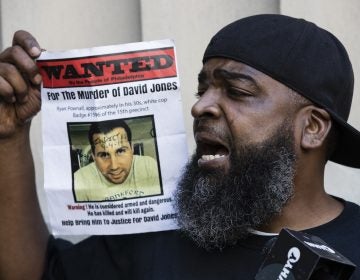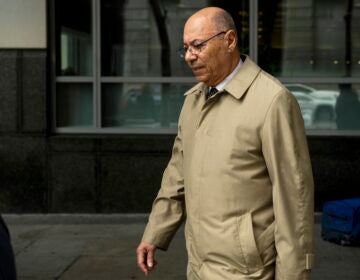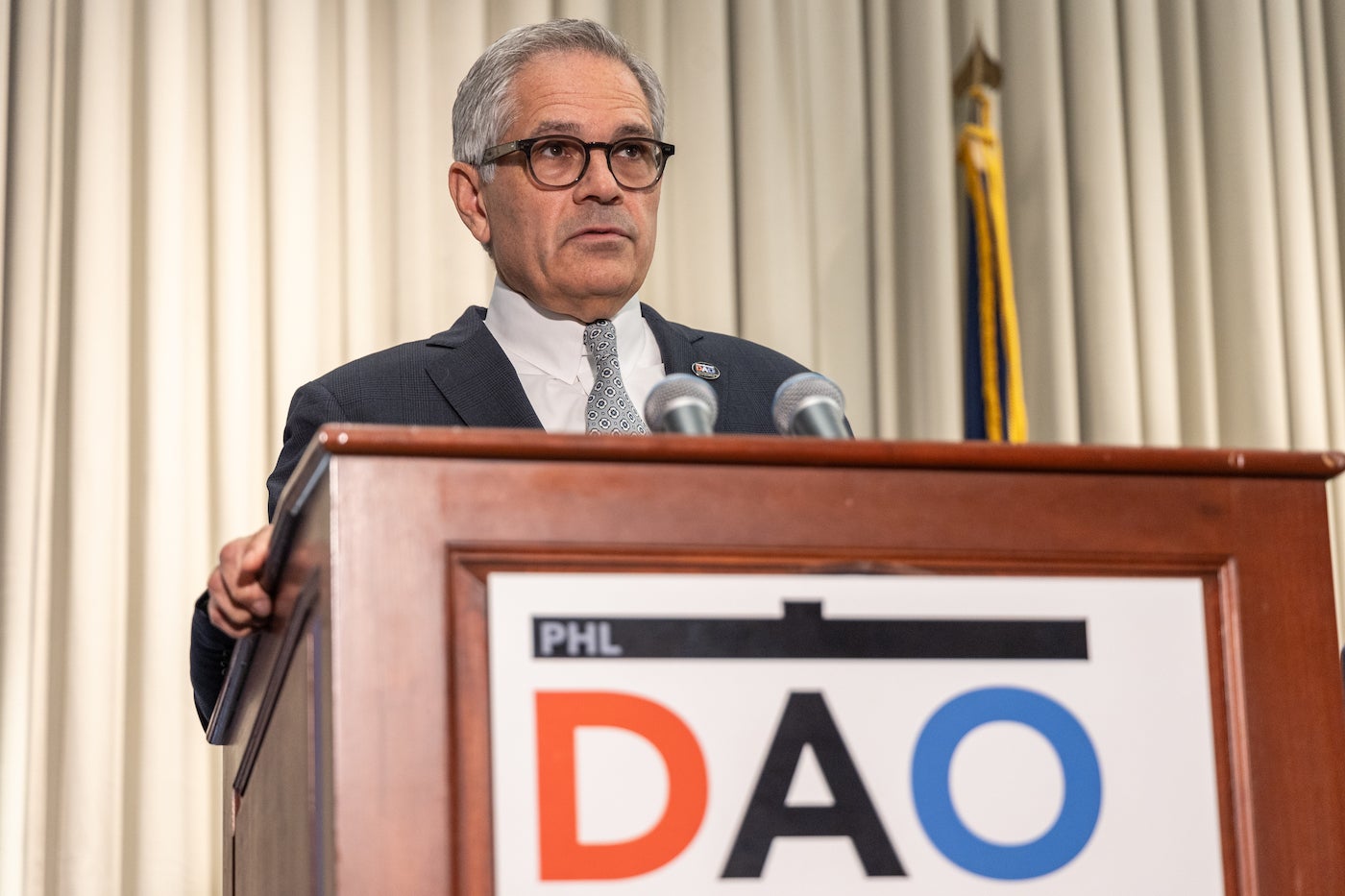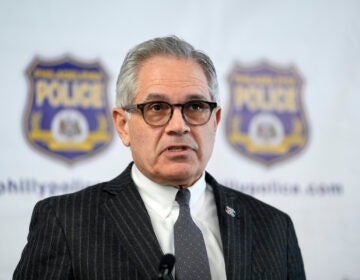A police killing in Philadelphia could change Pa. use-of-force cases forever
Philadelphia’s district attorney wants the state’s highest court to alter the instructions jurors hear before rendering verdicts in cases where police use deadly force.

Philadelphia District Attorney Larry Krasner. (Jose F. Moreno/Philadelphia Inquirer)
This story originally appeared on Spotlight PA.
Philadelphia’s district attorney is challenging Pennsylvania’s use-of-force law ahead of a former police officer’s landmark murder trial, and the outcome could raise the bar for law enforcement statewide.
Larry Krasner’s office is set to try ex-officer Ryan Pownall for fatally shooting David Jones, a 30-year-old unarmed man, as Jones ran from a traffic stop. But first, it’s asking the state Supreme Court to consider the constitutionality of a section of a Pennsylvania law that allows officers to use deadly force to prevent someone from escaping arrest.
A favorable ruling for Krasner wouldn’t alter state law, but it would change jury instructions in similar cases and could impact an ongoing conversation happening among lawmakers in Harrisburg.
Under current Pennsylvania law, officers are justified in using deadly force if a person is attempting to escape and has “committed or attempted to commit a forcible felony” or possesses a deadly weapon.
Krasner’s appeal to the Pennsylvania Supreme Court is focused on a 36-year-old U.S. Supreme Court ruling that he says held the opposite to be true.
In that ruling, Tennessee v. Garner, the justices concluded, “The use of deadly force to prevent the escape of all felony suspects, whatever the circumstances, is constitutionally unreasonable.” Instead, an officer can only use such force to prevent an escape while having “probable cause to believe that the suspect poses a significant threat of death or serious physical injury to the officer or others.”
In a brief filed this month, Krasner’s office argued that, among other issues, state law is silent on the definition of “forcible felony” and very broad in its consideration of what a deadly weapon is, meaning these sections don’t pass constitutional muster.
Pennsylvania jurors deliberating in cases like Pownall’s should be told “ors” in a section of the law outlining when police can use deadly force should be read as “ands,” raising the bar for officers and more closely aligning the statute with the language of Tennessee v. Garner, the brief continued.
“We cannot have state law that encourages and incentivizes police officers to violate the Constitution while they are killing people,” Krasner said earlier this month.
In court documents, an attorney for Pownall said he acted in accordance with state law as it’s currently written and argued construing it in a different fashion would violate his due process rights.
Shanda Sibley, an assistant clinical professor of law at Temple University, doubts whether the added context Krasner seeks will fundamentally change dynamics and outcomes in police trials, given the volume and density of jury instructions.
“The way that information is presented isn’t very user-friendly,” Sibley said. “It’s just the judge droning on and reading a bunch of instructions in a row at the end of what is oftentimes a fairly long, exhausting, and complicated trial. … I’ve seen jury instructions go on for hours.”
Sibley sees a greater chance for impact when jurors ask for certain instructions — namely those around use-of-force rules — to be repeated or clarified while they’re deliberating.
David Harris, a law professor at the University of Pittsburgh who agrees with Krasner’s argument, said, “What matters here is telling jurors a correct version of the law.”
Harris said the legislature has failed to address issues with the law for decades. Without movement in Harrisburg, he said the existing statute needs to be “interpreted to be consistent with the constitutional law that governs the law of every state.”
There is another justification in Pennsylvania’s use-of-force law that aligns more closely with U.S. Supreme Court precedent but still gives officers wide latitude in perceiving a threat. It allows police to use deadly force when they are preventing an escape and believe the person “will endanger human life or inflict serious bodily injury unless arrested without delay.”
U.S. Supreme Court decisions in Tennessee v. Garner and a similar case four years later, Graham v. Connor, both support the use of deadly force if law enforcement has an “objectively reasonable” belief that a fleeing person presents a risk to police or others — even in cases where a gun isn’t present.
That was the justification used by Michael Rosfeld, a former police officer in Allegheny County who fatally shot 17-year-old Antwon Rose II as he ran from a traffic stop in 2018. (Rose was, like David Jones, Black, unarmed, and shot from behind by a white officer.)
Rosfeld said he believed the teen possessed a weapon and presented a risk to public safety, and that belief alone was enough for a jury to acquit him of criminal homicide charges. The jury foreman later said Rosfeld was scared and “didn’t know what the kid had.”
Allegheny County prosecutors called Rosfeld’s actions intentional and said he was not acting to prevent death or serious injury.
“You can never explain, to me or to any rational person, how three shots to the back is acceptable force,” Rose’s mother, Michelle Kenney, said later.
Democratic lawmakers agreed, but their legislative efforts to tighten Pennsylvania’s use-of-force law have largely gone nowhere, encountering resistance from state police, police unions, and Republican legislators.
A bill sponsored by state Reps. Ed Gainey and Summer Lee, both Democrats from Allegheny County, would permit a police officer to use deadly force only to “protect himself or another from imminent death, serious bodily injury, kidnapping, or sexual intercourse compelled by force or threat.”
A version was referred to a Republican-controlled House committee in 2019, but it was never considered by the panel.
Opponents included the statewide chapter of the Fraternal Order of Police, which wrote at the time: “Any legislation intended to ‘move the target’ by setting new and possibly unconstitutional legal standards for police uses of force risks upsetting a system that has worked successfully for Pennsylvanians for many years.”
Gainey told Spotlight PA that while he and Lee were unable to “build the necessary consensus to move the bill forward last session,” they are “continuing to work with our colleagues and experts to find a path forward for this critical reform.”
He added, “I believe this change will save lives and allow the justice system to take its course as intended.”
 Spotlight PA is an independent, non-partisan newsroom powered by The Philadelphia Inquirer in partnership with PennLive/The Patriot-News, TribLIVE/Pittsburgh Tribune-Review, and WITF Public Media.
Spotlight PA is an independent, non-partisan newsroom powered by The Philadelphia Inquirer in partnership with PennLive/The Patriot-News, TribLIVE/Pittsburgh Tribune-Review, and WITF Public Media.
WHYY is your source for fact-based, in-depth journalism and information. As a nonprofit organization, we rely on financial support from readers like you. Please give today.






